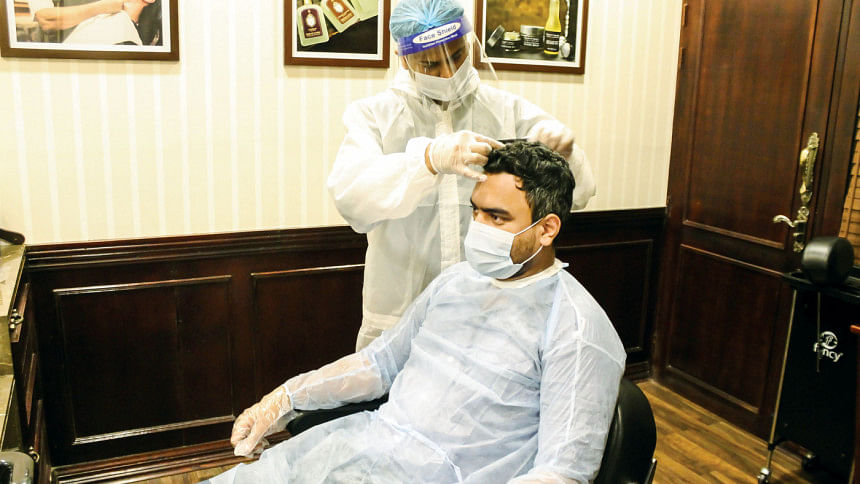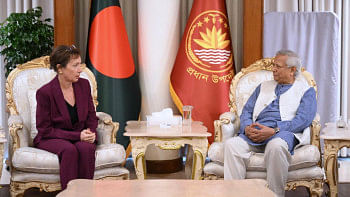Barbershops adapt to the ‘new normal’

The Covid-19 outbreak has affected all spheres of life, but those which involve close contact services pose an added challenge.
Haircut is one of the more obvious example, and barbershops have heavily paid the consequences, having had to shutter down for several months.
Since their reopening and after the lifting of the "general holiday", barbershops -- from upscale brands to the local favourites -- are striving to adapt to the new normal, with health standards being the key priority.
A number of establishments have their barbers wear Personal Protective Equipment (PPE), beyond just masks and gloves, and body temperatures of customers checked before entry.
Some businesses, like The Barber's Lounge in Gulshan, has limited the number of guests in their establishment at a time.
"We have five seats for haircuts. But to maintain physical distancing, we now allow only three seats to be occupied at any given point in time, ensuring that there is adequate gap between customers," Safayat Rana, owner of The Barber's Lounge said, adding that only a maximum of two customers can be present at a time in the waiting area.
Many barbershops in the mid-range to premium spectrum, are heavily pushing for appointments as opposed to walk-ins.
To visit Truefitt & Hill, an international brand deemed the "world's oldest barbershop", one would require filling out a risk assessment form and setting up an appointment.
Mahira Husain Khan, CEO of Truefitt & Hill Bangladesh, said the detailed form inquires whether one has recently visited a Covid-19 patient, whether the person has shown any symptoms etc.
Khan emphasises on maintaining very high health standards throughout. "We're using disposable aprons and towels. We block a station for about 30 minutes to clean it thoroughly before using it again," she said.
Trying to scoop some optimism out of the uncertainty, Rana from The Barber's Lounge said, "Nobody knows when the pandemic will end. But it is teaching us new ways of doing things. Sterilisation has always been a priority, but of course now it has an even bigger focus. Hopefully, when it will all be over, we will still continue with some of the improved practices."
But what about the numerous tiny barbershops, which are so much a fabric of the neighbourhood, having loyal customers they serve and know intimately?
Winner Saloon is one such barbershop, and Suresh, its owner and a barber himself, says it was a nightmare during the "lockdown" when his business temporarily came to a halt.
"It became a matter of survival. I was called in by a few customers to provide haircut at their homes, but that's all," he said. "My staff left Dhaka for their hometowns."
He informed that after reopening, business has been slow: "My co-workers returned and measures like wearing masks and rigorous cleaning are in place, but nowadays we hardly get even 10 customers a day."
Abdur Rahim, a worker in another such tiny barbershop in the capital said, "Many barbers like I generally work on commission and tips. There is no fixed salary. So, you can imagine the hardship we are facing!"
As for customers, perceptions and approaches hugely vary. Abedul Islam, a senior manager in a local conglomerate, said he rushed to a salon immediately after movement restrictions ended: "For work and corporate meetings, I need to have my hair properly trimmed, and that's something I would not trust an amateur family member with."
But many are unconvinced. "Why risk it? I have long hair now, but I sport it stylishly and I love it," Shahidur, a college student from Dhanmondi said.
Meanwhile, his older brother Hafizur, who has to attend office, says he went for haircut twice in recent months, but availed fewer services than usual: "Normally, after haircut I would indulge in a massage or facial. But now, I only stick to haircut."

 For all latest news, follow The Daily Star's Google News channel.
For all latest news, follow The Daily Star's Google News channel. 



Comments